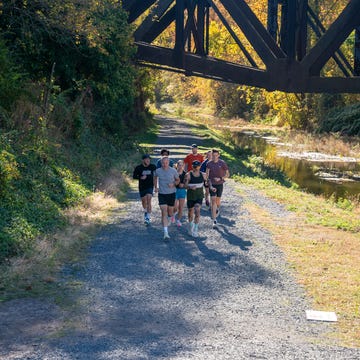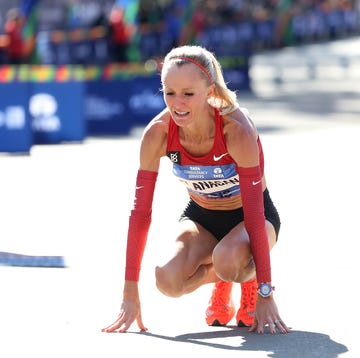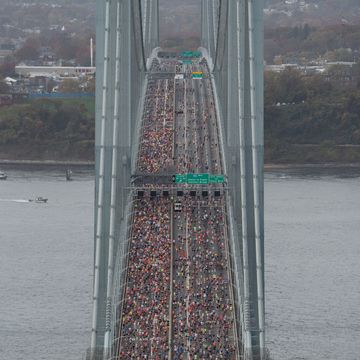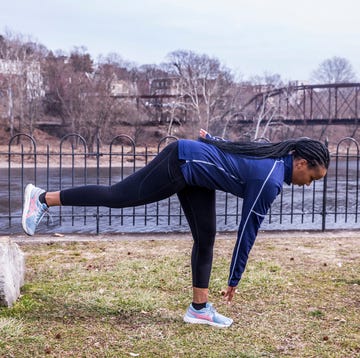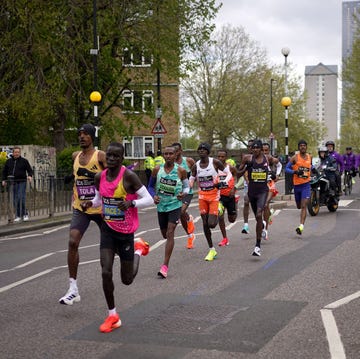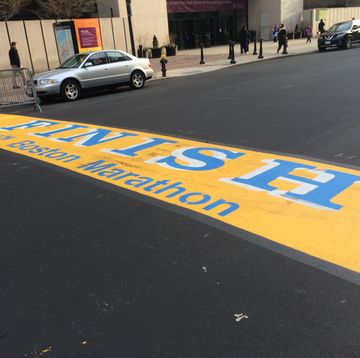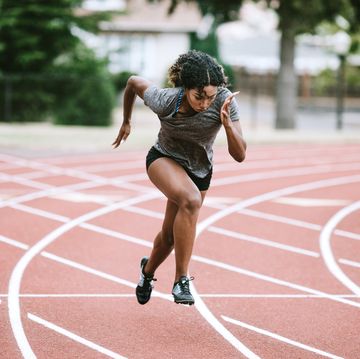Julia Chase-Brand never intended to be a pioneer, trendsetter or rabble-rouser a half century ago. She just loved to run and didn't like being told she couldn't.
As a 19-year-old on Thanksgiving Day in 1961, she became the first woman in the U.S. to officially finish a major road running race. She had done the training to complete the 4.7-mile Manchester Road Race, but she had to defy the Amateur Athletic Union, which threatened to ban her for life from all sports, and the still-prevalent notion that women just shouldn't pursue athletics so vigorously.
Now, 50 years later, as she's preparing to return to the race, she still gets choked up about the memories of that fateful Thanksgiving Day.
"Those were very, very different times back then," says Chase-Brand, 69, who is the medical director for Lawrence & Memorial Hospital in New London, Conn. "It's very emotional to see the wave of young women running having their joy in doing their thing."
Chase-Brand developed a passion for sports as a young girl in Groton, Conn., often running 1.5 miles to school. At the time, women weren't allowed to compete in events longer than 880 yards and were never allowed to compete in events with men.
Her interest in distance running was piqued as a young teen after her father pointed out Olympic marathoner John J. Kelley training on a 3-mile loop around a golf course in Groton. A former All-American at Boston University, Kelley continued to train while working as a school teacher and won the 1957 Boston Marathon and the 1959 Pan American Games marathon.
Chase-Brand recalls frequently watching Kelley run and one day, with a friend, getting the courage to ask him if he'd train them. He refused, saying he was too busy but suggested his former college teammate, George Terry, who'd been living in his basement.
"I fobbed them off on George," Kelley told the Hartford Courant in 2005. "Only Julia stuck. She really wanted to become a runner."
Under Terry's guidance, Chase-Brand won and set a record in the 880-yard run at the 1960 New England championships. Two weeks later, she found herself at the U.S. Olympic trials in Abilene, Texas, where she placed eighth.
She kept training with Terry and, occasionally, Kelley after she started her freshman year at Smith College. When she returned to Groton for Thanksgiving break, she accompanied the two men and a few other runners to the race in Manchester. From the outset, she'd said she was just going to get a workout in and didn't want a race number, but she was still surprised at the intense push-back she received from race officials.
"That was the first time I really had the door slammed in my face," Chase-Brand recalls. "But it was actually the guys who were most outraged."
Terry, who was Kelley's brother-in-law at the time, took Chase-Brand under his wing and officially challenged the rule the following year. She knew she was taking a big risk. The AAU threatened to ban her from all amateur athletics, and Chase-Brand, who at that point was an aspiring runner, had also been a trampolinist and a competitive swimmer.
Terry had polled several college coaches on the matter and received encouraging results. He also got the support of the state's AAU long-distance chairman Charlie Robbins, himself a former Manchester winner. Race officials finally relented and said she could run if she was properly trained and officially applied.
To remove any doubt, Terry had Chase-Brand run a small 6.5-mile road race in Chicopee, Mass., where race officials didn't have any problem with women running. That was two weeks before the Manchester race, and Chase-Brand not only finished but she beat eight men.
That led to intense public scrutiny, with dozens of publications--including Life magazine, Sports Illustrated and The New York Times--interviewing her for articles. To make matters worse, the AAU had told Manchester race officials if they allowed Chase-Brand to run, they'd revoke the amateur status of anyone else who participated.
"Behind the obvious question of whether they'd let me run or not, was whether or not women should run distance or not," Chase-Brand says.
Unfazed, she still planned to run. She wore her Smith gym suit (a blue and white top with a skirt bottom) and put on makeup to look as feminine as possible.
"I wanted to make it very clear that I was a woman who liked to run distance. I had done it since I was 5," she recalls. "I didn't want to cause this kind of commotion. I just wanted to run. But remember, this was maybe six years after Rosa Parks, and we kind of all knew what you had to do if you were the first person. You just got up and did what had to be done."
On race morning, two other women ran in support of Chase-Brand's cause--18-year-old local high school student Diane LeChausse and British Olympian Chris McKenzie, who was originally there to watch her husband race but decided to run, too.
The three women conferred briefly and then went to the back of the pack of runners assembled at the starting line. Chase-Brand still gets emotional remembering how her nerves tingled in the moments before the start.
"When the gun went off, officials came out and kind of body-blocked us; we just kind of zipped around them and ran," she says. "Nobody interfered after that. The runners in the race were all very encouraging."
Kelley won the race in 24:21 and Terry finished in the top five, but the large crowd at the finish line--which included many of the men who'd run--wanted to see which, if any, of the women would finish. McKenzie had been ahead of Chase-Brand by a bit but veered off course in the homestretch, apparently worried she might face repercussions. Moments later, Chase-Brand made her history-making charge to the finish, crossing the line in 33:40 in 128th place, ahead of 12 men. LeChausse came through 8 minutes later as the last finisher.
The following summer, Chase-Brand continued to train, running in a handful of track and road races, as well as the 13.1-mile Pikes Peak Ascent in Manitou Springs, Colo. When Terry joined the Peace Corps in 1963, Chase-Brand dropped out of college. Bringing little more than a desire to see how good of a runner she could become, she went to Los Angeles to train under Mihaly Igloi, the renowned Hungarian coach who'd defected during the 1956 Olympics in Sydney and had begun training rising American stars Jim Beatty and Bob Schul.
Chase-Brand trained 80 miles per week under Igloi (all on the track), but managed only 15th in the 880 at the 1964 U.S. Olympic trials.
"At some point, I had compared notes with Billy Mills and we decided I was running a lot more miles for the 880 than he was for the 10,000," Chase-Brand recalls. "But the 880 was all they had for women back then."
Chase-Brand went back to college and, while working with a humanitarian youth group to help build a civic center in the Ivory Coast in 1965, was injured in a car accident, effectively ending any hope of training again.
She earned a zoology degree and set off on a 25-year career as an animal behaviorist that sent her around the world studying bats, gorillas and shore birds. She married and had two children. At 49, she went to medical school and became a psychiatrist.
Although her knees are "shot to hell," Chase-Brand will be on the starting line at the Manchester Road Race on Nov. 24, with her son, grandson and high school friend Dagny Soderberg, who became the first woman Outward Bound counselor in the 1960s.
Chase-Brand has been back before and served as the race's honorary chairperson in 2005. This time, she'll be there to honor her late father, who died in 1960, and Kelley, who passed away at age 80 on Aug. 21. She's remained close to the Kelley family since her childhood in Groton; Kelley named his oldest daughter Julia after his AAU-defying protege.
She downplays her part in the advent of competitive women's running in the U.S., but is proud to have played a role.
"A lot has changed since then," she says. "I've always meant to write Joan Benoit [Samuelson] because when she won the Olympics in 1984, she said, 'This is a thank you to the women who came before me,' and I took that as a personal thank you and never told her that."


